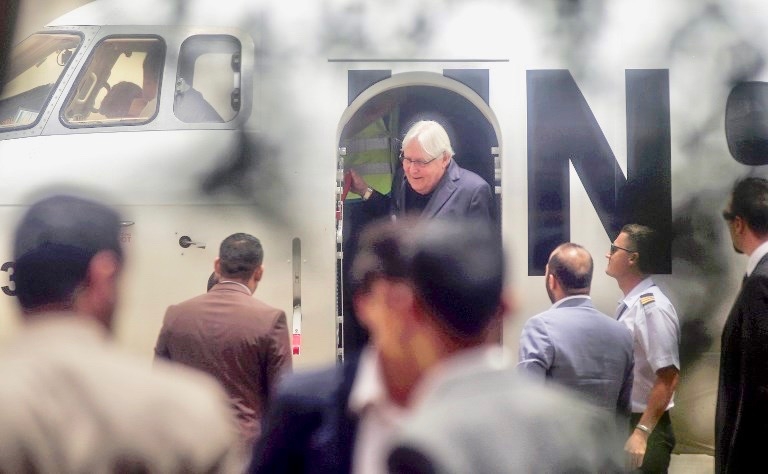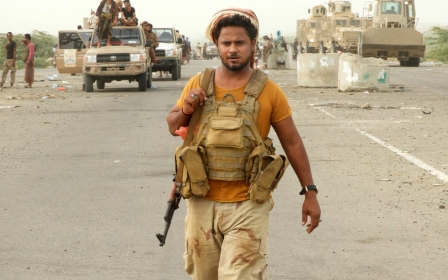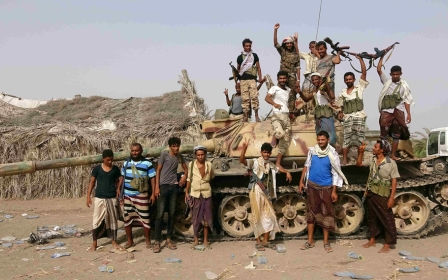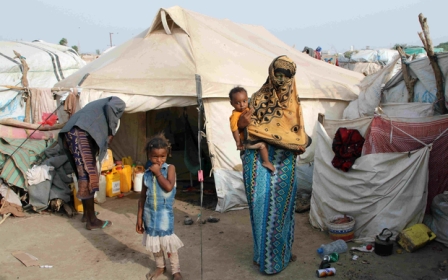UN envoy in Yemen for emergency talks on Hodeidah crisis

The UN envoy for Yemen held emergency talks in rebel-controlled capital Sanaa on Saturday over the key aid port of Hodeidah, where a regional coalition is battling Houthi rebel fighters.
Martin Griffiths was believed to be pushing a deal for rebel leaders to cede control of the Red Sea port to a UN-supervised committee and halt heavy clashes against advancing government troops backed by Saudi Arabia and the United Arab Emirates.
The envoy did not make any statement on his arrival at Sanaa international airport.
More than 70 percent of Yemeni imports pass through Hodeidah's docks and the fighting has raised UN fears of humanitarian catastrophe in a country already teetering on the brink of famine.
UAE Minister of State for Foreign Affairs Anwar Gargash on Twitter backed "the envoy's efforts to facilitate the safe handover of Hodeidah to the legitimate Yemeni Government".
"The people of Hodeidah urgently want to be liberated. The coalition will continue with its military and humanitarian preparations to achieve this urgent result," Gargash wrote.
Yemen's government and its allies launched their offensive on 13 June, and since then at least 139 combatants have been killed, according to medical and military sources.
The Houthi rebels have controlled the Hodeidah region with its population of about 600,000 people since 2014.
Samaa al-Hamdani, an analyst at the Sanaa Centre for Strategic Studies, said the Houthis have an incentive to agree to Griffiths' likely proposal because they are being "choked up," according to Aljazeera.com.
"If they go on with this war they can completely fight to the death and probably lose because they don't have the resources that the UAE and Saudi Arabia have," she told Al Jazeera from Washington, DC, adding that such a scenario would be "detrimental to the civilians".
Still, the Saudi-led coalition might be less inclined to give consent to the plan, Hamdani told Al Jazeera. "Their reputation is on the line ... They want to come in and fight this and have a clear victory."
Blockade of port
Earlier this year, the Saudi-led coalition imposed a near-total blockade on the city's port, alleging it was being used as a conduit for arms smuggling to the rebels by its regional arch rival Iran.
The capture of Hodeidah would be the coalition's biggest victory of the war so far. Rebel leader Abdel Malek al-Houthi on 14 June called on his forces to put up fierce resistance and turn the region into a quagmire for coalition troops.
The Yemeni army on Saturday claimed it had seized control of the rebel base at Hodeidah's disused airport, which has been closed since 2014.
An AFP correspondent on the front line could not confirm the report and a spokesman for the coalition, which has troops taking part in the offensive, did not respond to repeated requests for comment.
Still, military sources later denied that the army had entered the airport.
They told AFP, however, that sporadic clashes were underway at the airport's southern gate.
The highway between Hodeidah and the government-held port of Mokha was also the scene of fighting, they said.
French newspaper Le Figaro reported on Saturday that French special forces are present on the ground in Yemen, citing two military sources.
The French Defence Ministry said on Friday that France was studying the possibility of carrying out a mine-sweeping operation to provide access to the port of Hudaida once the coalition had wrapped up its military operations, Reuters said.
The ministry stressed that France at this stage had no military operations in the Hodeidah region and was not part of the Saudi-led coalition, Reuters added.
The United Nations and relief organisations have warned that any all-out assault on Hodeidah would put hundreds of thousands of people at risk.
The fighting is already nearing densely populated residential areas, the Norwegian Refugee Council warned, and aid distributions have been suspended in the west of the city.
The International Committee of the Red Cross said thousands are likely to flee if the fighting continues.
The World Health Organization called on all sides "to protect health workers and their facilities from harm, as well as to ensure unimpeded access for medical teams seeking to treat the wounded".
On 14 June, the UN Security Council demanded that Hodeidah port be kept open to vital food shipments, but stopped short of backing a Swedish call for a pause in the offensive to allow for talks on a rebel withdrawal.
The Yemen war has claimed some 10,000 lives since the coalition intervened in 2015 when President Abd Rabbuh Mansour Hadi fled into exile to Saudi Arabia when the rebels overran much of the country.
More than 22 million Yemenis are in need of aid, including 8.4 million who are at risk of starvation, according to the UN, which has described the conflict as the world's worst humanitarian crisis.
New MEE newsletter: Jerusalem Dispatch
Sign up to get the latest insights and analysis on Israel-Palestine, alongside Turkey Unpacked and other MEE newsletters
Middle East Eye delivers independent and unrivalled coverage and analysis of the Middle East, North Africa and beyond. To learn more about republishing this content and the associated fees, please fill out this form. More about MEE can be found here.




